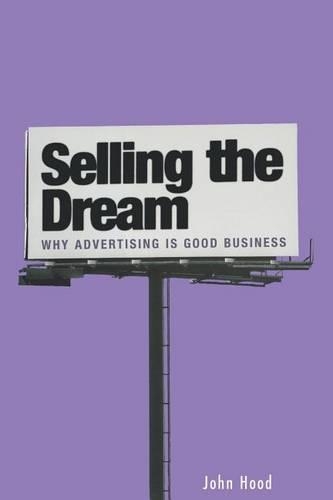
Selling the Dream: Why Advertising Is Good Business
(Paperback)
Available Formats
Publishing Details
Selling the Dream: Why Advertising Is Good Business
By (Author) John M. Hood
Bloomsbury Publishing PLC
Praeger Publishers Inc
30th October 2005
United States
Classifications
Professional and Scholarly
Non Fiction
History of specific companies / corporate history
Encyclopaedias and reference works
659.1
Physical Properties
Paperback
272
Width 156mm, Height 235mm
454g
Description
The process of producing goods and services is relatively easy to recognize as socially beneficial. But television ads Telemarketers Jingles Junk mail It is popular to view these commercial activities as inherently wasteful or manipulative, marginally informative or entertaining, at best. In Selling the Dream, John Hood takes the provocative stand that advertising images and sales pitches are actually part of the goods and services themselves, delivering an essential component of the consumer's experience. As such, they are inextricably linked to the basic tenets of the free-market system, and, in the boldest of terms, Hood argues that commercial communication is morally consistent with the principles of our democratic society, including freedom of choice, competition, and innovation. Tracing the history of advertising from Ancient Roman times to the present, he offers a colorful account of advertising in its cultural context and addresses such controversial issues as the promotion of harmful and immoral products (such as alcohol and tobacco), marketing to children, the role of advertising in service industries such as health care and education, and the impact of the Internet and other new media on the conduct of commerce. In the process, he offers a compelling perspective on advertising and its essential role in business, communication, and popular culture.
Reviews
Hood provides a fascinating look into the world of advertising and beyond to support his view that advertising provides a societal good: it promotes freedom of choice, competition, and innovation. As written by Hood, the evolution of advertising is quite an interesting journey. Although advertising is generally regarded as a modern phenomenon, the author traces the growth of promotion and commerce back to cobblers in Babylonia who hung shoes on their shop doors 5,000 years ago. Merchants of ancient Rome used such advertising techniques as pictures, brand names, and slogans to differentiate their wares. Each century has added its own stamp to the art of advertising, with town criers, handbills, newspapers, radio, and television all providing new ways to reach successive generations of consumers. Hood notes that no less an advertiser than Benjamin Franklin used advertising to differentiate his famous stove from others that would damage the eyes and shrivel the skin. He examines a wide range of advertising topics, including conspicuous consumption, product health claims, and economic and societal factors. Highly recommended. Upper-division undergraduate and graduate marketing students, faculty, researchers, and practitioners, as well as anyone interested in advertising. * Choice *
Consultant and journalist Hood reacts to how Americans feel in general about advertising by reminding them that marketing fulfills desires and demand while increasing profits and often making or breaking whole businesses and industries. Along with very well-chosen (and very funny) examples of how Americans feel and deal with advertising as represented in popular culture. Hood is brutally honest about why some may perceive advertising as a trail of lies, showing that in fact the industry is held to a rather strict set of standards and tends to react to that same consumer desire and demand that helps to define it. * Reference & Research Book News *
Author Bio
John Hood is President of the John Locke Foundation, a public policy think tank based in Raleigh, North Carolina, where he also serves as publisher of the foundation's monthly newspaper, the Carolina Journal. A professional writer whose articles have appeared in such publications as The New Republic, National Review, Reason, The Wall Street Journal, and the New York Times, he is the author of Investor Politics and The Heroic Enterprise.
